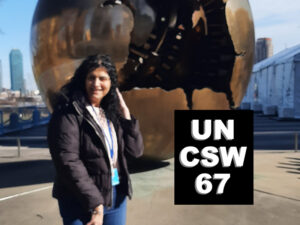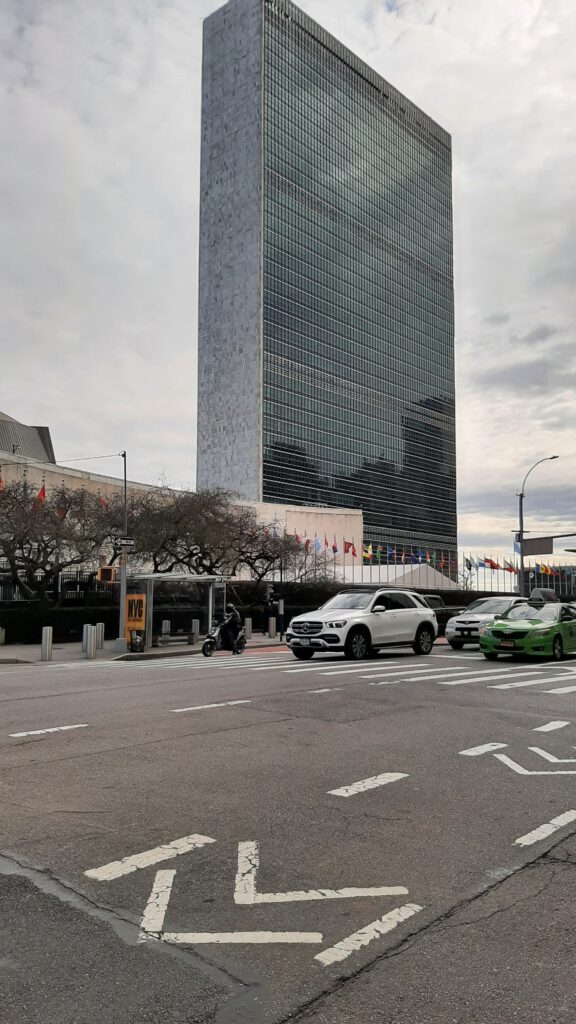Technology, cyber space and total isolation – UNCSW67

I could not guarantee my arrival to the UN Commission on the Status of Women (UNCSW67). I do not take the trip and journey to New York with ease.
I do not take for granted how many people, organizations and supporters it took to get me here. Before anything else, I would like to thank everyone at UNCSW67 for giving me a spot to be among you. I would like to thank Wi’am: The Palestinian Conflict Transformation Center in Bethlehem for supporting my representation here and KAIROS Canada without whom I may not have made it. I attended the UNCSW67 along with KAIROS representative Chery McNamara under the accreditation of ACT Alliance, a global faith-based coalition.
Throughout this week, so many sessions have addressed women and their space in different forms of modern advancement today. I would like to address one aspect specifically which is the internet and cyber-space. Most people do not think of cyberspace as a skewed void. The general impression is that it is open for all, and a place where you can find anyone and anything. I am here as a Palestinian to tell you, this is not my experience.

There are some prerequisites for women’s participation and inclusion in technology and employment. Safety might be considered one of those things. For the average Palestinian woman, every dimension of life is impacted by one form or another of violence. Whether by occupying forces, by the state, by the community or by the family and spouse. With statistics on domestic violence alone as high as 59 percent of Palestinian women in general and as high as 70 percent of Palestinian women in Gaza, security seems to be a dream.
Today we add a new form of violence to our existence. According to Palestinian Central Bureau of Statistics (PCBS) “Digital space is not a safe place for women, as cyber violence against women is an extension and perpetuation of violence against women in the real world. About 10 percent of women who have ever been married (15-64 years) in Palestine were exposed to some forms of cyber violence through social media networks. Also, eight percent of women were exposed to violence through telecommunication (any threatening, blackmailing, or harassing different people or parties through calls or messages).”
Something all Palestinian women who have either experienced or witnessed violence of any kind in their lives have wished for is accountability. Wi’am with other civil society and women’s rights activists and organizations are working tirelessly to call for a new legal framework, policy reform and compliance to assure women that there is someone who knows and cares for the justice they deserve. We have yet to succeed. Modernisation, technology and the internet are like any and all forms of knowledge; a double- edged sword.
Sadly, we see that legislation and policy in Palestine when it comes to cyber-crime are not motivated to protect the victim but rather to shrink space for freedom of expression. As a result of this, women and especially young girls are caught in the crossfire. They are victims of gender-based violence online and new targets for trafficking rings.
We do what we can and give all we have to fight for a more just existence where women and girls in Palestine can get an equal footing and a leg-up into employment and technology as there is no lack of desire, will, or education to do so. When we have exhausted all national possibilities, we try to call on international companies and corporations that have played a central role in drawing the landscape of what the internet looks like today. However, without the political recognition of Palestine as a state and the ongoing disputes over geographical borders, the plea of our victims goes equally unrecognized.
Modernization is coming hand in hand with globalization. If the internet has opened doors to the whole world for us, how can our invisible boundaries still exclude and overlook us, making us more vulnerable to casualties? How can the most vulnerable be excluded by what seems like an open and all-inclusive space? How can our human rights defenders, who refer to UN conventions as their basis, still be erased from the internet? How can real life conflicts manifest so identically in the virtual world? Where are the safeguards that warfare is not translating into new spaces as well?
By Lucy Talgieh, the Women’s Project Coordinator at Wi’am: The Palestinian Conflict Transformation Center
